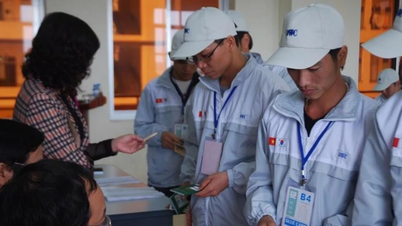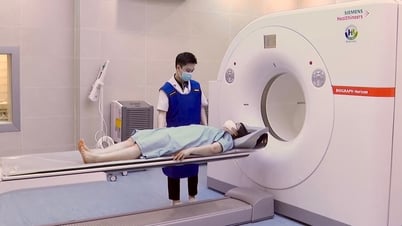Infusion at home is potentially dangerous, there have been many deaths, so people need to be careful.
Recently, in Lao Cai city (Lao Cai province), after receiving IV fluids at home, a 62-year-old woman showed signs of anaphylactic shock and was taken to the emergency room but died. Accordingly, on July 12, 2024, a representative of the Lao Cai City People's Committee said that on the afternoon of July 8, the patient felt tired so she called an acquaintance to come and give IV fluids at home.
 |
| Infusion at home is potentially dangerous, there have been many deaths so people need to be careful and not abuse this. |
After the transfusion, she showed signs of anaphylactic shock and was given anti-shock medication before being taken to Lao Cai General Hospital for emergency treatment. However, the patient passed away at 9:00 p.m. the same day.
Previously, a 42-year-old woman living in Hoang Mai district, Hanoi, after using the home vitamin C infusion service provided by a private medical facility, the patient began to experience symptoms of itching, difficulty breathing, pale skin and then fell into a state of shock.
The family immediately took the patient to Bach Mai Hospital for emergency treatment. There, doctors diagnosed the patient with severe anaphylactic shock and had to perform intensive resuscitation. Fortunately, after 48 hours of treatment, the patient was out of danger.
Also regarding the consequences of self-administering IV fluids, on March 2 in Krong Buk district, Dak Lak province, a 71-year-old woman died after receiving IV fluids at a private clinic in the area.
In 2022, a 28-year-old female patient was tired and had a fever. She went to a clinic in Binh Tan district, Ho Chi Minh City and was diagnosed with dengue fever on the first day. She was given IV fluids but suddenly had cardiac arrest and stopped breathing.
On July 4, 2024, the Inspectorate of the Ho Chi Minh City Department of Health administratively handled an advertising unit providing IV services at home. Accordingly, after discovering that Toan Phuc Medical Company Limited (Ward 1, District 11) advertised providing IV services at home, the Inspectorate of the Department of Health conducted an inspection.
Through investigation, it is known that Toan Phuc Medical Company Limited is directed by Mr. HQD. This facility was granted a business registration certificate by the Department of Planning and Investment of Ho Chi Minh City for the business of trading in sanitary supplies and products.
At the time of inspection, it was recorded that the ground floor of the company contained medicines such as Ringer Lactate 500ml, Glucose 5%, Polymina Kabi 250ml and medical equipment and tools such as cotton, gauze, tape... along with books recording information related to the implementation of infusion services and trading of pharmaceutical products.
Mr. HQD has not been able to provide invoices or documents of origin for all the drugs in storage; at the same time, he has not been able to provide legal documents on the business of these drugs.
The Health Department Inspectorate requested Toan Phuc Medical Company Limited to immediately stop medical examination and treatment activities; drug trading activities at the facility and immediately remove advertising content in the field of medical examination and treatment when it has not been licensed by the competent authority as prescribed.
As home infusion services continue to grow, doctors and health professionals have repeatedly warned of the potential risks. Injecting yourself at home without medical supervision can lead to serious, even life-threatening complications.
Doctors also recommend that before deciding to use this service, people should consider carefully and consult with medical experts. At the same time, it is necessary to choose medical facilities with licenses and well-trained medical staff to perform the infusion service.
These patients were given emergency treatment, anti-shock treatment and intravenous fluids. After treatment, the patients' health stabilized and they were discharged from the hospital.
Medical experts warn that the situation of people using IV fluids at home to reduce flu and fever is very common. However, not everyone who uses IV fluids at home improves their health and reduces fever.
Associate Professor, Dr. Nguyen Tien Dung, former Head of the Department of Pediatrics, Bach Mai Hospital, said that infusion is to put into the body a certain amount of water, electrolytes, nutrients such as glucose, protein, fat, and vitamins.
However, there are many types of infusions, each with different ingredients and concentrations, and must be performed at medical facilities that have the conditions and capabilities to handle complications during infusion.
Before the transfusion, the patient needs to do blood tests, heart, lung, pulse, and blood pressure examinations to decide whether or not an transfusion is needed and in what dosage.
For example, if a patient has electrolyte loss and is given glucose, the illness will get worse; or if the patient is given glucose while the body is lacking sodium, the blood will be diluted, causing cerebral edema. In the elderly or in people with weak kidneys, incorrect IV fluids can also cause cerebral edema and stroke.
In addition, when receiving IV fluids at home, patients are susceptible to shock due to the rapid rate of infusion and the risk of infection due to failure to ensure sterilization of instruments or incorrect vein access, requiring repeated access.
According to the recommendations of the Ministry of Health, medical facilities, doctors and nurses need to prescribe appropriate medications and only inject when other routes of administration cannot be used.
Depending on the patient's condition, the doctor will advise on the appropriate type of fluid to be infused. However, not all patients with fever need to be infused and can be infused at any time.
When people self-administer IV fluids without test results, without assessing the extent of damage and underlying medical conditions, they are more susceptible to complications.
Some other experts also emphasized the fact that many people think that IV fluids help their bodies get better, so they do not go to the doctor, while the disease is silently progressing.
Arbitrarily infusing fluids can make the disease worse, risking complications due to missing the golden time. In addition, when infusing fluids at home, emergency conditions cannot be as good and complete as in medical facilities, patients cannot be treated promptly, the risk of death is higher.
Doctors recommend only administering IV fluids when the fever is too high, vomiting too much causes dehydration, or the patient has diarrhea, low blood pressure, etc., and cannot eat or drink.
Before the transfusion, patients need to be carefully tested. People with mild illness only need to supplement water by drinking, nutrition, and exercise to increase resistance.
If the body shows abnormal symptoms such as chills, difficulty breathing, swelling at the injection site, etc. during the infusion, the patient must immediately notify medical staff for timely treatment.
Absolutely do not buy medicine or invite someone to your home for IV without being examined, tested and prescribed by a doctor.
After a death due to IV infusion in the area, the Lao Cai Department of Health recommended IV infusion as an emergency measure, however, the IV technique must be performed by trained medical staff.
The type of infusion and the rate of infusion must be prescribed by the doctor, depending on the patient's condition. The infusion process must be carried out at medical facilities with full emergency equipment to prevent anaphylactic shock.
Intravenous injection at home is extremely dangerous, with many potential risks. The most serious complication is death due to anaphylactic shock, while the mildest complication is blood infection, fluid overload causing pulmonary edema, respiratory failure, and heart failure.
In addition, not all patients with fever need IVs and can be IVs at any time. When IVs are administered without test results, without assessing the extent of damage and underlying disease, people are more susceptible to complications.
Source: https://baodautu.vn/nguy-hiem-rinh-rap-khi-tu-y-truyen-dich-tai-nha-d222639.html


![[Photo] Readers line up to visit the photo exhibition and receive a special publication commemorating the 135th birthday of President Ho Chi Minh at Nhan Dan Newspaper](https://vphoto.vietnam.vn/thumb/1200x675/vietnam/resource/IMAGE/2025/5/17/85b3197fc6bd43e6a9ee4db15101005b)
![[Photo] More than 17,000 candidates participate in the 2025 SPT Competency Assessment Test of Hanoi National University of Education](https://vphoto.vietnam.vn/thumb/1200x675/vietnam/resource/IMAGE/2025/5/17/e538d9a1636c407cbb211b314e6303fd)

![[Photo] Prime Minister Pham Minh Chinh chairs meeting on science and technology development](https://vphoto.vietnam.vn/thumb/1200x675/vietnam/resource/IMAGE/2025/5/17/ae80dd74c384439789b12013c738a045)



















![[Photo] Nearly 3,000 students moved by stories about soldiers](https://vphoto.vietnam.vn/thumb/1200x675/vietnam/resource/IMAGE/2025/5/17/21da57c8241e42438b423eaa37215e0e)





































































Comment (0)